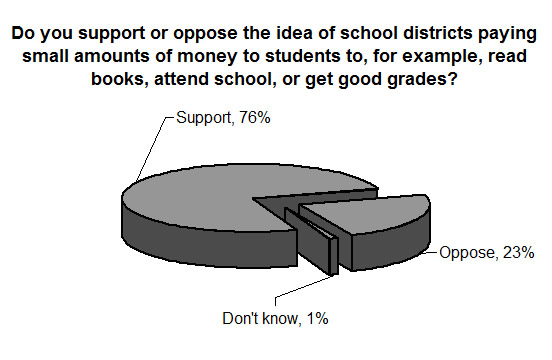By Miranda Buttram Posted October 20, 2010
With new programs in education, and different changes being implemented by the government, the US is taking a closer look at the education system. A recent poll was completed summing up the opinions and beliefs of Americans on their education system. Many call for change in the way the system is run.
The Phi Delta Kappa/ Gallop poll provided analyzed the current status of the American education system. Many topics of the education system were discussed in the poll, such as the concept that teachers’ pay should be based upon the achievement of the students. Almost three of four Americans believe the quality of work and not a standard scale should be used to determine teacher pay, with parents feeling equally strong about this issue. American teachers only spend 14 to 16 hours per year in professional development, while in some countries teachers have at least 100 hours of professional development annually. In addition, more than two of three Americans support paying teachers a higher incentive to teach in schools identified as needing improvement.
Teacher Jeff Setzer said, “There is not a realistic way to measure that [the students’ achievement], because all of the schemes that I have seen are based on standardized testing, and to base a teacher’s pay on a test score is, first of all, to ignore the previous years the kid has had in the education system than to say that since I have you as a student sophomore year then your English scores are based on what I have taught you in the last five months. It’s unrealistic.”
While there is a debate on whether or not to base teachers’ pay on performance, in contrast, there is a belief that parents are an important factor in determining whether students learn in school. In 2010, 78% of public school parents believe that the parents play a more important factor in children’s learning, while only 21% believe it is the school. With the increasing importance of education and college degrees, more weight is being put on the parents’ ability to teach their children in addition to the school’s need to educate them.

Bobbi Thacker, a parent of a Lowry student, agreed, “I feel the parents have a stronger impact, making their kids go to school, their morals, teaching the kids what is right and wrong, and I do believe a stronger impact will come from home.”
Many students, at one time or another, have heard of another student getting paid for their achievement for their schoolwork. However, 75% of Americans oppose the idea of paying students to read books, attend school, or strive for better grades. However, only one in four parents said they actually paid their children to do better in school.
Thacker also said, “I definitely feel children should be rewarded for doing well, however, I don’t think it should be monetary, I don’t think it should be materialistic, I think they should be praised by words.”





